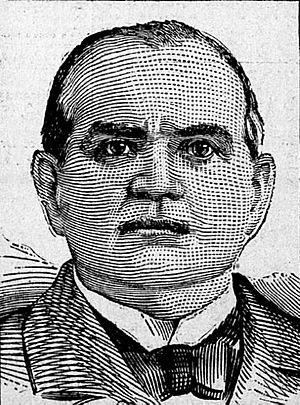J. Floyd King facts for kids
Quick facts for kids
John Floyd King
|
|
|---|---|
 |
|
| Member of the U.S. House of Representatives from Louisiana's 5th district |
|
| In office March 4, 1879 – March 3, 1887 |
|
| Preceded by | J. Smith Young |
| Succeeded by | Cherubusco Newton |
| Personal details | |
| Born | April 20, 1842 St. Simons Island |
| Died | May 8, 1915 (aged 73) Washington, D.C. |
| Resting place | Arlington National Cemetery Arlington, Virginia |
| Parent | Thomas Butler King |
| Relatives | Henry King |
| Education | University of Virginia at Charlottesville |
| Occupation | Lawyer, politician |
| Military career | |
| Allegiance | |
| Service/ |
|
| Years of service | 1861–1865 |
| Rank | |
| Unit | |
John Floyd King (born April 20, 1842 – died May 8, 1915) was an important American politician. He served as a U.S. Representative for the state of Louisiana.
Contents
Early Life and Education
John Floyd King was born on April 20, 1842. His birthplace was St. Simons Island, which is off the coast of Georgia. His father, Thomas Butler King, was also a politician who served in Congress for Georgia. John was also the nephew of Henry King, who was a Congressman from Pennsylvania.
John King went to several schools as he grew up. He studied at the Russell School in New Haven, Connecticut. He also attended Bartlett's College Hill School in Poughkeepsie, New York. Later, he went to the Military Institute of Georgia. Finally, he studied at the University of Virginia at Charlottesville.
Serving in the Civil War
After his schooling, John King joined the Confederate States Army. This was during the Civil War, which lasted from 1861 to 1865. He served in the Army of Virginia throughout the entire war. He rose through the ranks and became a colonel of Artillery.
Becoming a Lawyer and Public Servant
After the Civil War ended, John King moved to Louisiana. There, he became involved in "planting," which meant managing large farms. He also decided to study law. In 1872, he passed his exams and was "admitted to the bar." This meant he officially became a lawyer and started his own law practice in Vidalia, Louisiana.
King also took on other important roles in Louisiana. He was appointed as a brigadier general for the state's troops. He was also elected to be an inspector of levees. Levees are walls built to prevent rivers from overflowing. He also became the president of the board of school directors in his area. Additionally, he served as a trustee for the University of the South.
Time in Congress
John Floyd King was a member of the Democratic Party. He was elected to the United States House of Representatives in 1879. He served four terms in Congress, from March 4, 1879, to March 3, 1887.
During his time in Congress, he held an important position. He was the chairman of the Committee on Levees and Improvements of the Mississippi River. This committee worked on projects to manage and improve the mighty Mississippi River. In 1886, he tried to be nominated again for Congress but was not successful.
Later Years and Legacy
After leaving Congress, John King became involved in mining operations. He lived in Washington, D.C. for many years. Later in his life, he took on another government role. From May 19, 1914, until his death, he served as the Assistant Register of the United States Treasury. This job involved helping to manage the country's money.
John Floyd King passed away in Washington, D.C., on May 8, 1915. He was buried at Arlington National Cemetery, a famous cemetery in Virginia where many important Americans are laid to rest.
 | Percy Lavon Julian |
 | Katherine Johnson |
 | George Washington Carver |
 | Annie Easley |

